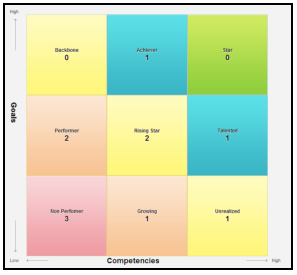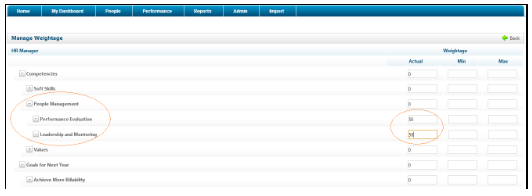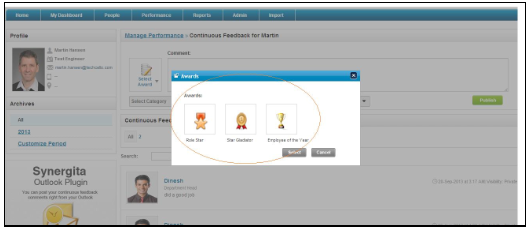Chapter 6
Manager / Execution Problems
6.1 Managers are not trained
John Sullivan: in most organizations, managers are not trained on how to assess and give honest feedback. If the process includes a career development component, it is even more likely that managers will not know how to enhance the career path of their employees.
When manager have no clue about what is expected of them while providing feedback and how they are to approach the same, the process of performance management is going to be a nightmare for everyone in the organization. Everyone, will be left clueless and without a sense of direction or purpose. Appropriate training and guidelines should be given to managers and they should be apprised on the importance of sharing honest feedback and also how that will in turn help the employee and the organization. When managers understand the important of the task at hand, we can be sure that they would do their best to complete it successfully.
Solution
While the organization‘s HR must take complete initiative to train their managers about the performance management process, its importance and tips to evaluate employees honestly and the best approaches to pass on feedback to the employees, Synergita provides an opportunity to reinforce these training imparted to managers. In the Synergita home page, the organization can share these best practice and guideline documents that managers can refer to at any point of time.
Also, at the time of providing feedback, clear descriptions and rating guidelines can be provided to managers in the evaluation form itself. This helps managers to better understand the employee evaluation form and thereby provide honest and appropriate feedback to the employee.
6.2 Managers are "chickens"
John Sullivan: some managers will do almost anything to avoid tough decisions or confrontation. Some provide no differentiation and spread “peanut butter” (an even distribution) to avoid it, while others give everyone “above average” ratings. Some managers will provide feedback that is extremely vague in order not to offend anyone. Rarely if ever is anyone immediately terminated as a result of the process.
Managers often try to avoid tough confrontations with their direct team. They feel that it would be easier to have a smooth talk with their subordinates at all times and thus they can maintain a good relationship with the team members. However, what managers fail to realize here is that unless they provide the right feedback to the employees, the employees might never realize what they need to do right in order to develop or correct themselves and it might only result in a much more frustrated employee sometime in near future.
Solution
With Synergita, we can make sure that managers can provide appropriate feedback and also substantiate their ratings/feedback with detailed descriptions or comments and also upload supporting documents for the feedback given. When managers are able to add such documents to support their feedback, they might feel more comfortable about providing honest and open feedback about the employee. Confronting the employee‘s questions at the time of sharing the feedback with them becomes easier for managers with this feature.

6.3 Gaming the system
John Sullivan: often managers artificially rate individual employees to save money or to keep employees from becoming visible for promotion. Some selfishly give a score just below that required for a pay increase, while others give scores just above the point where they would be required to take disciplinary action.
Managers may resort to the above behaviours owing to various reasons such as reluctant to confront a difficult situation, forcefully trying to stop an individual from being promoted, etc.
Solution
Features such as 360-degree feedback, continuous feedback, etc., help in overcoming the above mentioned problem.
Synergita ‘s 360-degree feedback feature provides for feedback to be captured from more than one source. In this feature, feedback may be obtained from the employee, peers, co-managers (other manager‘s), subordinates, etc., apart from the manager. When feedback is obtained from various sources, managers will not be able to fabricate incorrect feedback, in which case the manager‘s feedback will be way different than the one obtained from other sources.

The continuous feedback feature also helps in resolving this issue. In continuous feedback, the employee‘s performance feedback is captured on a continuous basis. Therefore, there is a continuous record of how the employee has performed at various times during the year. Here again, continuous feedback can be obtained from different sources. Features such as 360-degree, continuous feedback, etc., bring about a lot of transparency into the performance management process and there gives little room for incorrect/fabricated feedback.
6.4 Recency errors
John Sullivan: managers, especially those who don’t consult employee files and data, have a tendency to evaluate based primarily on events that occurred during the last few months (rather than over the entire year).
Managers typically will have multiple team members reporting to them and it becomes difficult for them to remember everything about an employee‘s performance over a period of time. Unless they meticulously maintain records of how the employee performed at regular intervals, it is almost impossible for them to recollect an employee‘s performance throughout the year and their rating are influenced by the employee‘s most recent performance (in the last few months). This is called recency error. Due to the recency error, employees do not get complete credit for their work done all through the year.
Solution
Synergita‘s continuous feedback module helps in reducing the effects of recency error. Continuous feedback is a module which allows managers and other employees to be able to record the feedback about an employee‘s performance then and there, on a continuous basis. The system also allows managers to access this continuous feedback at the time of rating and managers can retrieve the performance feedback of an employee for the specified evaluation period. The system also provides for grouping the feedback into different categories and assigning rewards and provides a quick snapshot of the number of feedback obtained in each category/reward.

This module also provides flexible features such as a being able to post a continuous feedback from your e-mail server instead of logging on to the Synergita performance management system and therefore saves a lot of time for managers and enables them to keep a record of the employee‘s performance very easily without having to spend a lot of time for the same.

By means of facilitating continuous feedback and making it available for reference to the managers at any point of time and also at the time of performance evaluation, Synergita helps to solve the recency error.
6.5 Corporate culture issues
John Sullivan: subjective appraisals can restrict cultural change in organizations. In some organizations, there are cultural norms and values that influence performance appraisals. For example, in one organization new hires were automatically given an average rating for their first year, regardless of their actual performance. One top performing hire I knew abruptly quit after receiving this cultural gift.
This is a common problem faced in organizations where there is no proper system for performance evaluation.
Solution
With the various mechanisms for capturing feedback such as 360-degree mechanism, continuous feedback, customized evaluation forms, etc., Synergita makes it possible to provide objective feedback and there is little room for subjectivity. Such strong channels of performance management help organizations to achieve the cultural shift towards a more comprehensive and transparent system of performance evaluation.
6.6 Inconsistency across managers
John Sullivan: some managers are naturally “easy raters” while others are not. As a result, employees working under easy managers have a better chance of promotion due to their higher scores. In firms that rely heavily on the narrative portion of the assessment, having a manager with poor writing skills may hamper an employee’s career. Without “benchmark” numbers to set as a standard, inconsistency is guaranteed in large organizations.
Every person perceives things differently. This is also true of managers. Some managers could be extremely lenient while others might be extremely stringent while evaluating their team. This usually brings about an inconsistency in ratings or evaluations among managers.
Solution
Synergita provides a simple remedy for this problem. In the Synergita performance management system, there is a provision to provide a clear description for each evaluation parameter. Here, the organization can explain to manager what that evaluation parameter means for an employee at a certain level. Synergita provides the flexibility of being able to customize the employee evaluation forms for different groups of employees. Therefore, even the same evaluation parameter can be explained differently for different groups of employees. Providing clear descriptions of what the expectation are on each evaluation parameter, it will bring about uniform understanding about expected levels of performance for each employee group among managers.

Apart from providing description on evaluation parameters, Synergita also has a feature where clear rating guidelines can be provided. Example: If an evaluation parameter such as "Timeliness" is rated on a 1 – 4 scale, the organization will be able to clearly define under what circumstances an employee should be rated as 1, 2, 3 or 4. When such guidelines are available for reference at the time of providing feedback, managers will be able to reference the same, understand the expectations on each score level for each evaluation parameter and then provide their rating. Such clear descriptions will help to bring a consistency among the ratings provided by managers within an organization.

6.7 Managers don’t know the employee
John Sullivan: managers of large and global organizations, as well as newly hired and “transferred in” managers may be forced to do appraisals on employees they barely know. Recently promoted managers may be forced to assess their former friends and colleagues. Following a merger, managers are likely to be confused about whether to focus on the whole year or just “post-merger” work.
When manages barely know their employees, it becomes very hard for them to be able to provide any feedback at all. In such situations, managers often tend to play safe by trying to stay at the mid-ranges (not rating too high or too low). This type of feedback might demotivate a good performer and will not server to pin-point the areas of growth for a poor performer. Employees will not see any value of the feedback and the basic essence of the appraisal itself would be lost.
Solution
While Synergita‘s 360-degree review would help this situation to an extent, managers might still not be able to obtain a complete insight into the employee‘s performance history and aspirations. Synergita fills this gap by capturing all past feedback and the same is available for the manager to refer to at the time of feedback. By referring to the past appraisal feedback, managers will be able to understand the consistency of performance for an employee, the areas in which the employee has improved from the past year, any inputs, suggestions or concerns that the employee may have raised during the past year, their aspirations, training recommended, etc. This insight would prove to be extremely useful for managers, especially, new managers who do not have any idea about their new subordinates.
The continuous feedback of the employee is also available for reference to the manager at the time of providing appraisal feedback. The continuous feedback page would have captured feedback about an employee‘s performance at different times during the year. From continuous feedback, managers will be able to obtain details about the employees‘ performance throughout the appraisal period.
Synergita also helps maintaining "Career aspirations" in which employees can be asked specific questions about their career aspirations and the same are recorded. The career aspirations page could contain details about an employee‘s future growth aspirations within the organization, relocation preferences, if any; educational pursuits that the employee might want to do in order to benefit his career, etc. This information will also prove to be very insightful for the new managers.
6.8 Secret codes
John Sullivan: I did some work with an army unit where by custom literally everyone got a perfect numerical score. So assessments by higher-ups were made as a result of interpreting “code words” in the small written narrative portion of the assessment. Unfortunately, if your commander didn’t know the code words, your army career was limited.
This type of problem generally dwells when the performance management system is not transparent and people do not have a complete understanding of how the systems works.
Solution
Synergita is a simple and user friendly system. Its many features such as 360- degree feedback, continuous feedback, individual development plans for employees, ability to keep track of career aspirations, training, etc., keep the system very transparent and there is no room for surprises. Synergita‘s flexible reporting feature enables managers to obtain quick inputs about employee‘s performance and thereby make informed decisions.

6.9 Mirror assessments
John Sullivan: most people, and managers are no exception, have a tendency to rate people like themselves more positively. This can result in discrimination issues.
It is common human tendency to compare others work to them and managers are no exception to this rule. However, every employee is unique and the way they approach their tasks would be different. Also, the performance and approach to solutions by an employee will largely vary based on their skill- sets, their job role, their experience levels, etc.
Solution
When managers are given clear descriptions to understand the expected performance levels for an employee, it will help them to steer away from comparing the employee‘s work output to their own standard of work. Synergita has provisions where organizations will be able to customize the performance evaluation forms for every employee level or job role, etc. Example: An evaluation parameter "Requirements understanding" can be explained differently for an employee performing a job at an entry level and for an experienced employee. These differentiations can be clearly brought out in the Synergita performance evaluation system.
Organizations can create any number of performance evaluation forms for their employees and each of these forms can be associated with a certain group of employees. These classifications can be based on job title, department, work level, etc. Also, for each evaluation parameter in these forms, clear descriptions of the expected level of work achievement can be provided. Thus managers know what to expect from the employee and will be able to evaluate them based on expected work output levels instead of comparing to their own work.

6.10 Managers are not rewarded
John Sullivan: managers that go out of their way to provide honest feedback and actually improve the performance of their workers are not rewarded or recognized.
With the flexibility of being able to have customised performance evaluation forms for different job types, managers can be specifically rated on how well they evaluate their employees and help them to improve their performance. Weights can be associated to each evaluation parameter and based on this, managers who execute this responsibility well can be recognized.

Synergita‘s Continuous feedback and social recognition module also has provisions where the organization can create any number of awards and recognize individuals who have performed well in the respective areas. This is a good place to recognize managers who focus on performance evaluation and how well they cater to the developmental needs of their team members.

6.11 Managers don’t own it
John Sullivan: Managers often feel they don’t own the process, so they invest little in it and proceed to blame HR for everything. Managers would embrace it instead of grumbling if they were presented with a positive correlation proving that managers who did excellent performance appraisals were among the highest performers with regards to business result and bonus awards.
This again is a common problem faced by many managers. Since the managers do not have a major part in structuring or driving the performance management process, they feel that they do not own the process and hence there is no drive from their end to complete these processes effectively on time.
Solution
The Synergita performance management solution has the provision for designing employee specific review plans. Here, the HR can give complete control to the managers and allow them to design their own performance management plans for their team members. Managers could create individual development plans, performance improvement plans, training evaluation plans, end of project reviews or any other developmental plan for their team. They will also be able to set the review frequencies, decide on the group of reviewers and decide on evaluation parameters while creating these plans. These plans are totally owned by the managers and by means of these review plans, they will be able to track the development of their team. When managers are given the freedom and flexibility to structure their own developmental plans for their team, their ownership becomes more on these areas. The feedback gathered during these interim review plans can also be used as reference at the time of yearly appraisals.













